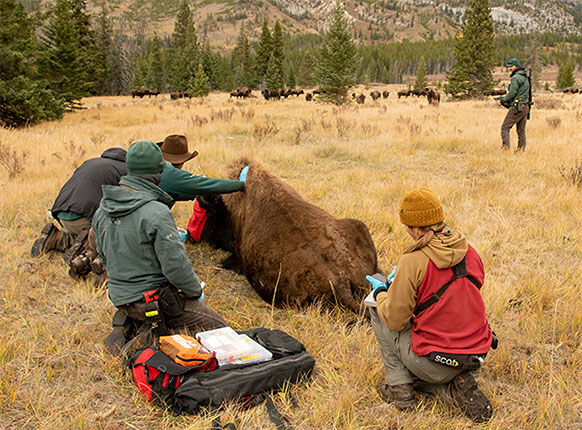No Slides Entered.
Four UW Students to Present Research During "Science On Tap" on Feb. 5
Four University of Wyoming students will present their research to the public during a Science Café Wednesday, Feb. 5, from 6-8 p.m.
The event, labeled “Science on Tap” and hosted by UW’s Biodiversity Institute, will take place at Bond’s Brewing Co., located at 411 S. Second St. in Laramie. The event is free and open to the public.
The four UW graduate students will present casual talks about their research, with time for a question-and-answer session following each talk and at the end of the event.
“At the Biodiversity Institute, we believe it’s important that students receiving our Biodiversity Graduate Student Research Enhancement Grant communicate their projects with the public. We encourage our awardees to connect with communities through public outreach that best suits their projects and audiences,” says Abbey Morales, communications and marketing specialist for the Biodiversity Institute. “Our Science Cafes are particularly popular with communities and students as a way to share the amazing research that’s happening at the University of Wyoming. We’ve hosted Science Cafes all over the state — in English and Spanish — and look forward to connecting with people in a casual way.”
The four UW graduate students and their projects are:
- Mary De Aquino, “Ant-Following Birds in Panama: How They Use and Share Resources.” In Panama, carnivorous army ants perform large raids to capture their insect prey. Many birds attend these swarms to capture and consume insects — including scorpions — that attempt to escape the ants.
“At ant swarms, I collected data that will allow me to address questions about how bird species share resources at ant swarms; the roles that different species play within these mixed-species bird groups; and how these groups will be impacted by species loss,” de Aquino says. “To address this last question — how ant-following bird groups will be impacted by species loss — we performed a removal experiment in which we temporarily removed certain species from the swarm to see how this impacted group composition and the behavior of species remaining at the swarm.”
De Aquino, of Placerville, Calif., is a doctoral student in the Department of Zoology and Physiology.
- Spencer Holtz, “How Contemporary Evolution Is Actively Affecting Species.” Holtz is using genetic information to identify potential species of conservation concern. He wonders how species adapt to new environments as they’re forced to move due to climate change.
To study this, he’s using red flour beetles (Tribolium castaneum) in controlled lab experiments and simulating how beetles might shift their range and face new, stressful conditions. By studying their genetic responses, Holtz aims to understand how species can adapt to these changes, which is crucial for conserving biodiversity in our changing world.
Holtz, of Austin, Texas, is a doctoral student in the Department of Botany.
- Olivia Leviton, “Recreation Ecology in the Snowy Range.” Leviton is investigating the ecological and recreational carrying capacity of the Snowy Range Scenic Byway after an unprecedented national and local rise in recreation rates. This past summer, she deployed nine infrared trail counters and six magnetic vehicle counters in and along the Snowy Range Scenic Byway. She also conducted interviews with visitors to gauge their recreational experience.
Preliminary data revealed heavy use and significant trail misuse that has led to trail widening and de-vegetation. Half of the trail counters registered over 200 visitors per day, while parking areas, such as West Lake Marie, saw up to 285 vehicles per day. The road counters showed 740 vehicles passing through the east closure gate daily.
Leviton hopes her results will lead to management adjustments, including increased signage, improved educational outreach, and adjusted tourism advertising agendas to maintain the integrity of the landscape and its biodiversity.
Leviton, of Dillard, Ga., is a master’s student in the Haub School of Environment and Natural Resources.
- Jordan Von Eggers, “Time Traveling With Sediments: Impacts of Stocked Fish in Wyoming Mountain Lakes.” For her research, Eggers uses lake sediments of high alpine lakes in Wyoming, Washington, and California to trace the effects of these stressors over centuries, focusing on phytoplankton and zooplankton responses. Her work aims to anticipate future ecosystem transformations and understand the interplay of these stressors on mountain lake biodiversity.
“We often think of mountain lakes as pristine and undisturbed due to their remote nature, but human impacts can still affect these lake ecosystems in multiple ways,” she says.
Von Eggers, of Redmond, Wash., is a doctoral student in the UW Department of Geology and Geophysics.
For more information, email Abbety Morales at emorales3@uwyo.edu.
Share This Post
Jordan Von Eggers poses next to a llama while hiking to high alpine lake in the Wind River Range for soil core samples.
Social Media
Latest News



Archives
- All
- February 2026
- January 2026
- December 2025
- October 2025
- August 2025
- July 2025
- June 2025
- May 2025
- April 2025
- March 2025
- February 2025
- January 2025
- November 2024
- October 2024
- September 2024
- August 2024
- July 2024
- June 2024
- May 2024
- April 2024
- March 2024
- February 2024
- January 2024
- December 2023
- November 2023
- August 2023
- July 2023
- April 2023
- September 2022
- August 2022
- July 2022
- June 2022
- May 2022
- April 2022
- March 2022
- February 2022
- January 2022
- December 2021
- November 2021
- October 2021
- September 2021
- August 2021
- May 2021
- April 2021
- March 2021
- October 2020
- August 2020
- July 2020
- January 2020
- March 2019

